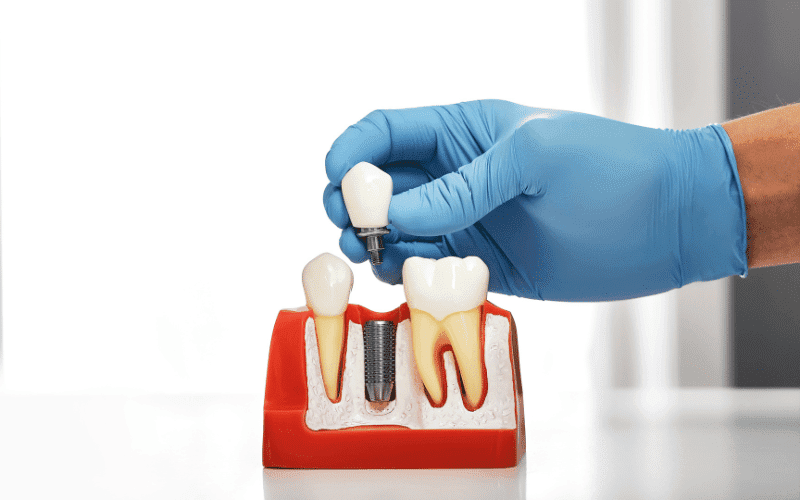Dental implants stand out as modern wonders in the ever-changing world of dental treatments, providing a permanent answer to the problem of missing teeth. Consider the following: a natural-looking, long-lasting grin that builds confidence. This transforming path, however, is only for some.
Beyond the promise, there are a number of critical issues. Who is eligible for this dentistry revolution, and who should exercise caution? Join us as we unpack the complexity of dental implant eligibility, delving into the critical elements of determining whether this cutting-edge technology fits your oral health goals.
Understanding Dental Implants:
Dental implants are titanium-based prosthetic tooth roots inserted into the jawbone to provide a long-lasting and natural-looking replacement for lost teeth. They are a long-term solution because when an adult tooth is gone, the region of the jawbone that holds the tooth deteriorates.
Before implant implantation, a bone grafting operation is usually conducted, and if successful, the implant and bone graft can last a lifetime. Dental implants are permanent teeth-like structures that are supported by a screw that serves as the artificial root.
There are several types of bone transplant techniques and methods available, including micro-implants for people who cannot fit regular implants.
Factors Influencing Candidacy:
The qualifying landscape for dental implants is shaped by bone health, medical issues, smoking behaviors, and gum health. Let us go into the nuances that govern candidature for this transformational surgery. We’ll go over some key points here:
1. Bone Health:
The jawbone’s health, which must fuse with the titanium post for success, determines eligibility for dental implants. Inadequate bone density, frequently caused by tooth loss or other disorders, can make implant support difficult.
A robust jawbone structure is required for implant support, and applicants with inadequate or weak bones may be ineligible. This problem can be addressed via bone grafting, which can help repair and rebuild the jawbone.
2. Medical Conditions:
Certain medical diseases, including uncontrolled diabetes, autoimmune illnesses, or radiation therapy, might impair healing and raise the risk of complications following dental implant surgery. Patients with these disorders may not be good candidates for dental implants, so they should talk to their dentist about other options.
Prescription medications like Bisphosphonates, which prevent osteoclast cells from eroding bone, can induce some uncommon disorders like osteonecrosis. You should talk to your dentist if you have been prescribed this medicine.
3. Smoking Habits:
Smoking raises the likelihood of implant failure owing to nicotine’s effect on blood flow, which interferes with the healing process. To boost the success of dental implants, dentists advise patients to stop smoking.
A 2020 research discovered that smokers were 2.6 times more likely than non-smokers to have peri-implantitis, emphasizing the need to avoid tobacco use in dental implants.
4. Gum Health:
Periodontal disease can impact implant stability. Thus, healthy gums are critical for the long-term success of dental implants. Individuals suffering from active gum infections may require treatment for good oral health.
Gum disease can cause gum and jaw bone deterioration, compromising implant integration. As a first step, consult a dentist to ensure you are free of gum disease.
Who Should Seek Alternatives?
Dental implants are a popular solution for many people. Still, individuals who still need to meet the eligibility requirements may be able to discover alternate solutions, such as removable dentures or dental bridges. These solutions provide practical and aesthetic benefits, are less permanent, and are typically less expensive.
Dental bridges, which may replace up to four teeth in a row and are ceramic, metal, or a mix of the two, are shorter and less expensive than implants. Conversely, dentures are lower-cost prostheses that require daily removal and cleaning and are easy to maintain. They can, however, be more visible and interfere with speech until the wearer adjusts to the prosthesis.
Understanding the subtleties of implant eligibility becomes critical as we traverse the convoluted arena of dental treatments. A dazzling grin greets those who match the qualifications. However, if circumstances demand differently, have no fear. Several options are available, and with the assistance of trained specialists, a confident and brilliant smile is still within reach.
The objective is to make educated decisions suited to individual needs, ensuring a journey towards optimal oral health adapted to each particular case. Accept the possibilities, investigate alternatives, and set off on a road that promises long-term dental happiness and a renewed sense of self-assurance.


